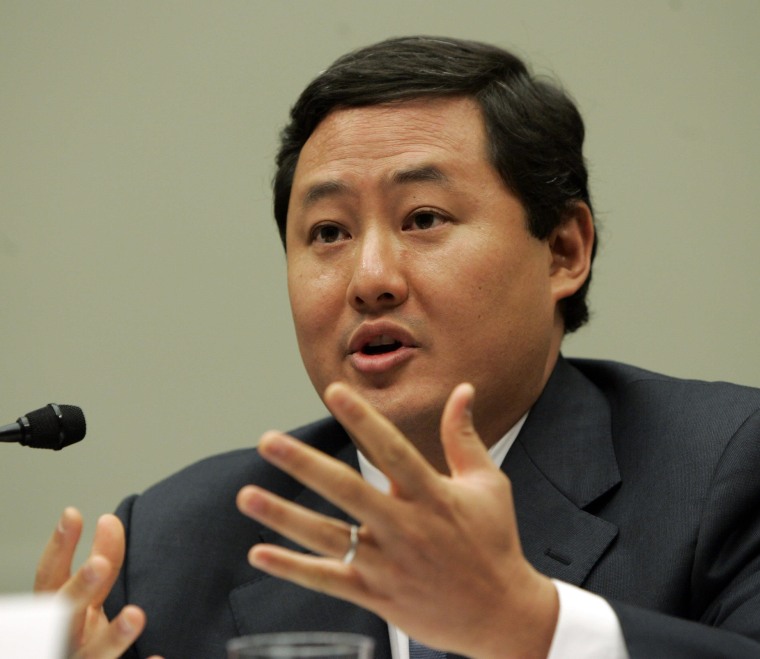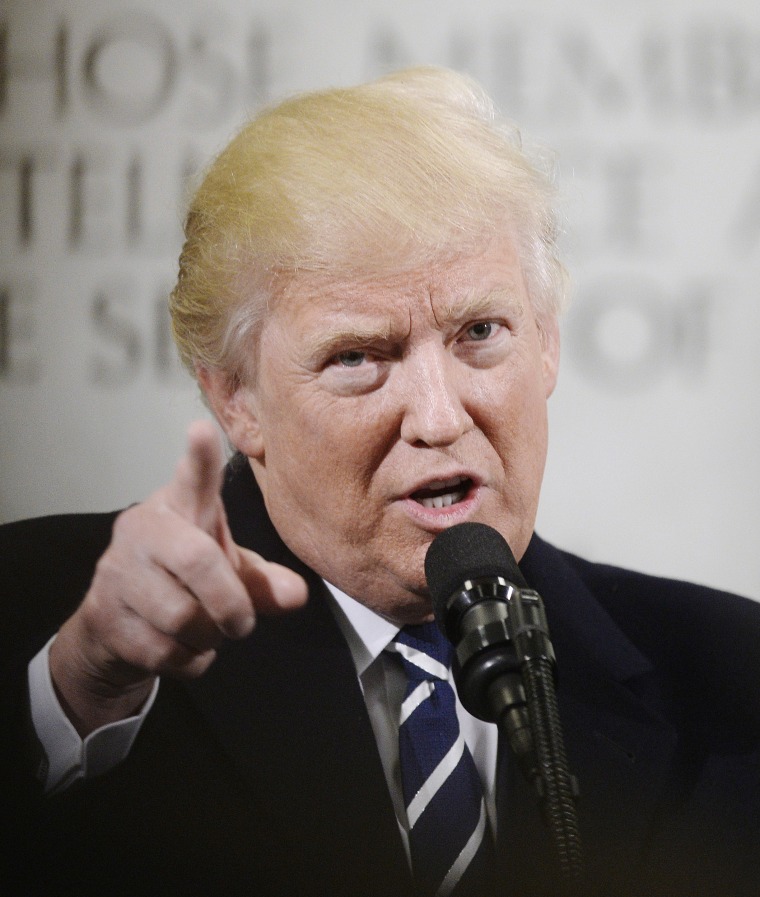A draft executive order circulating inside the government calls for studying whether the CIA should get back in the business of capturing and interrogating terrorists overseas, a program launched after 9/11 that President Obama banned because it involved the use of what most people consider torture.
A draft order, posted by the Washington Post and confirmed by NBC News, calls for the government to study whether the CIA can resume detaining suspects at so-called "black sites," a program initiated by George W. Bush that Obama banned when he took office. Black sites are secret overseas detention facilities where suspects are interrogated.
The draft also calls for a review of interrogation techniques laid out in the U.S. Army Field Manual, which prohibits torture and is currently the standard by which American interrogators must operate, the officials said. The review would examine whether tougher techniques could be effective.
Trump spokesman Sean Spicer told reporters Wednesday the draft "was not a White House document," and that "to the best of my knowledge," President Trump had not seen it.
The draft order would also revoke Obama's order closing the prison at Guantanamo Bay, which is still open. And it would repeal Obama's order to give the International Red Cross access to all prisoners in American custody as required by the Geneva Conventions, the officials added.
The draft raises questions about how far the Trump administration is willing to go in seeking to fulfill Trump’s repeated promises during the campaign to reinstate the program of torture that George W. Bush implemented after the 9/11 attacks. Trump famously said a year ago that "torture works," but expressed surprise after his election that his secretary of defense, James Mattis, was vehemently against it. Other Trump cabinet officials, including Attorney General designate Jeff Sessions, told lawmakers that water boarding is illegal.
A Senate report in 2014 concluded that the CIA’s program of brutal interrogations didn’t produce useful intelligence, something the officials involved with it dispute.
"No one inside the system is clamoring for a return to the old rules, and not one of Mr. Trump’s national security leaders supports either black sites or torture," a senior career intelligence official tells NBC News.
The source also points out that the draft executive order has not been discussed in the interagency process nor has it been seen by the principals. Congressional sources say Mattis and CIA Director Mike Pompeo told lawmakers they were not involved in the draft and was not aware of its existence.
Even if Trump signed the order, and even if subsequent studies recommended the resumption of brutal interrogation techniques, such techniques are currently barred by law, as the draft itself points out, according to a copy posted on the web site of the Washington Post.
It would require an Act of Congress to change that, as Pompeo acknowledged during his confirmation hearing. When asked whether he would obey an order from the president to resume water boarding, he said he wouldn't.
National Security Adviser Mike Flynn has also voiced opposition to using torture.
"If there's an American strategic advantage, it is our values. We must protect our values at all costs," Flynn said in December 2014, endorsing the conclusions of the Senate report that was highly critical of the CIA’s use of torture.
Sen. John McCain, R-Ariz., who survived torture as a prisoner in Vietnam, said on MSNBC’s Morning Joe Wednesday that "even though the Army Field Manual can be reviewed, it still does not allow to return to the use of torture, including waterboarding."
Critics have pointed out that Pompeo's answers to written questions by senators as part of his confirmation process left open the door to studying more aggressive interrogation techniques.
"I will consult with the experts at the Agency and at other organizations in the U.S. government on whether the Army Field Manual uniform application is an impediment to gathering vital intelligence to protect the country or whether any rewrite of the Army Field Manual is needed," Pompeo wrote. "If any such differences are justified, a fundamental requirement is that such differences fully comply with law, including laws governing the treatment and interrogation of individuals."
Pompeo assured Sen. Dianne Feinstein, D-Calif., who led the investigation that produced the Senate torture report, that he would consult with "career intelligence professionals," about any possible changes. Feinstein voted to confirm him.
Torture aside, it is also extremely unlikely, U.S. officials say, that the CIA would resume its own program of detaining prisoners abroad. Many CIA officers feel burned by what happened the last time they went down this road — many incurred legal bills and years of investigations. Moreover, other countries would have to agree to host such sites, knowing that the sites became public the last time this was tried.

Also, the same law that bans torture also requires that the Red Cross be given access to prisoners in U.S. custody, so it would in theory be illegal for the CIA to secretly detain people for any significant length of time.
According to U.S. military sources directly involved in intelligence policy, the U.S. military and multi-agency interrogation teams currently have access to terror detainees in a number of facilities around the world, including in Afghanistan, Iraq, Kuwait, Bahrain and Jordan. The Obama Administration also created an interagency High-Value Detainee Interrogation Group (HIG) under the FBI that has studied effectiveness, training, and techniques for the debriefing of detainees. The Army meanwhile has trained more than 3,000 interrogators in the past eight years and has created an Interrogation and Debriefing Training Facility in Texas.
The creation of an interrogation apparatus within the bounds of the law and under military regulation, the sources tell NBC News, has not only increased professionalism but also eliminated the likelihood that some future incident like 9/11 will catch the national security establishment "flat-footed."
The CIA, the sources say, is involved in interrogations still, but is no longer a lead agency. "I’m unaware of any voices within the Agency arguing for the changes Mr. Trump is considering," the senior intelligence official told NBC News.

